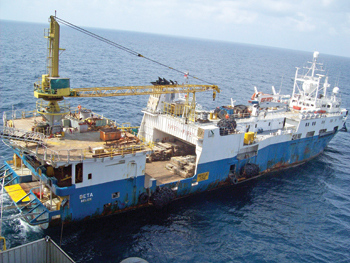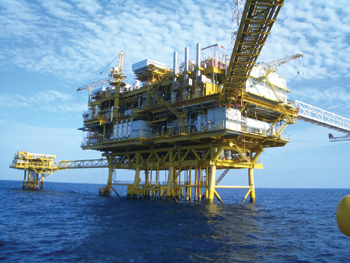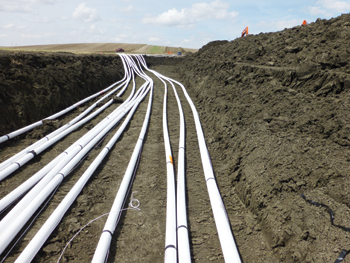
 PTTEP ... focusing on expanding reserves
PTTEP ... focusing on expanding reserves
PTT Exploration and Production Public Company Limited (PTTEP) is an independent upstream oil and gas group. The group explores, develops and produces oil and gas from its asset base. The group operates more than 40 exploration, development and production projects around the world. Geographically diversified asset base coupled with complementary investments could further strengthen the company’s business operations.
Increasing car ownership in Asia and its strong focus on strengthening its reserve base could further strengthen the company’s business operations. However, volatility in oil and gas prices, exploration and development risks, and declining demand for crude oil due to advanced vehicle technologies could affect its operations, says GlobalData in a strengths, weaknesses, opportunities and threats (SWOT) analysis of the Thailand-based company.
STRENGTHS
Liquidity position: PTTEP reported strong liquidity position in its balance sheet as compared to the previous financial year. Strong liquidity position could strengthen the company’s short term business operations. In December 2013, the group’s cash and equivalents increased by 176.4 per cent to THB7, 7342.8 million ($2356.2 million) as compared to THB 27980.6 million in 2012. This increase in cash position was due to 6.7 per cent increase in cash flow from operating activity which was indirectly correlated with the market conditions.
Complementary investments: PTTEP’s upstream business operations are strengthened with its investments in supportive businesses which has enabled the group to reduce its costs. PTTEP in association with its joint venture partners has investments in pipeline operations. This investment in pipeline project has helped the group to minimise the transportation costs in its overseas assets located in South East Asia.
Geographically diversified upstream operations: PTTEP has a strong base of upstream assets spread across diverse geography. Diversified asset base has strengthened the group’s upstream business operations. The group carries out international projects in Malaysia, Indonesia, Cambodia, Myanmar, Vietnam and Australia. The group performs its exploration and production operations either as an operator or as a joint venture partners with other oil and gas companies.
WEAKNESSES
Declining reserve replacement ratio (RRR): PTTEP’s oil and gas exploration and development activities could get affected with the declining reserve replacement ratio (RRR). RRR measures the amount of proved reserves added to the group’s reserve base during the year relative to the amount of oil and gas produced. During the fiscal year 2013, the group’s proved reserve declined by 6.1 per cent to 846 MMboe from 901 MMboe in 2012.
OPPORTUNITIES
Reserve expansion initiatives: PTTEP has substantial focus on strengthening its business operations reserve expansion initiatives. In April 2014, the group’s subsidiaries PTTEP Offshore Investment Company Limited and PTTEP International Limited announced their plans to acquire 100 per cent stake in Hess Thailand Holdings II Limited (HTH) and Hess Exploration Thailand Company Limited (HETCL), from Hess Corporation, an independent energy company, for a purchase consideration of approximately $1,000 million.
Increasing refinery investments across Asia-Pacific and the Middle East: PTTEP could further strengthen its operations in Asia Pacific with the increasing investments on refineries across this region. Existing refining projects worldwide will add around 8.6 mbpd of new distillation capacity in the period 2013–2018. Moreover, this will be supported by an additional 5.5 mbpd of conversion units, almost 7 mbpd of desulphurisation capacity and more than 2 mbpd of octane units.
THREATS
Exploration production and development risks: Future oil and gas exploration and production (E&P) may involve unprofitable efforts, not only from dry wells but also from producing wells, when they are not commercially viable. The combination of technology and recovery cost may be higher than revenue earned owing to production. In addition, drilling hazards and environmental damage could led to well shut down.
Vehicle technologies limiting demand: PTTEP’s business operations could get affected with the improvement in vehicle technologies across the globe. Beyond volume patterns, oil demand in the road transportation sector is determined by the efficiency of the vehicle fleet using internal combustion engines (ICE), and the pace of development and penetration of vehicle technologies, including hybrids and non-petroleum-based engines.
Volatility in oil and natural gas prices: The group’s revenue, profitability, and rate of growth are substantially dependent on prices of oil and natural gas.
In recent years, increase in the demand for crude oil and depletion in the oil reserves resulted in increase in the prices of crude oil and oil products across the world. Oil prices and markets have been extremely volatile in the recent years. Prices are affected by numerous factors such as market supply and demand, political and economic conditions, and the ability of the Organization of Petroleum Exporting Countries (Optec) to set and maintain production and price targets.










































































